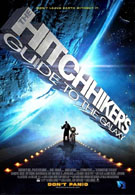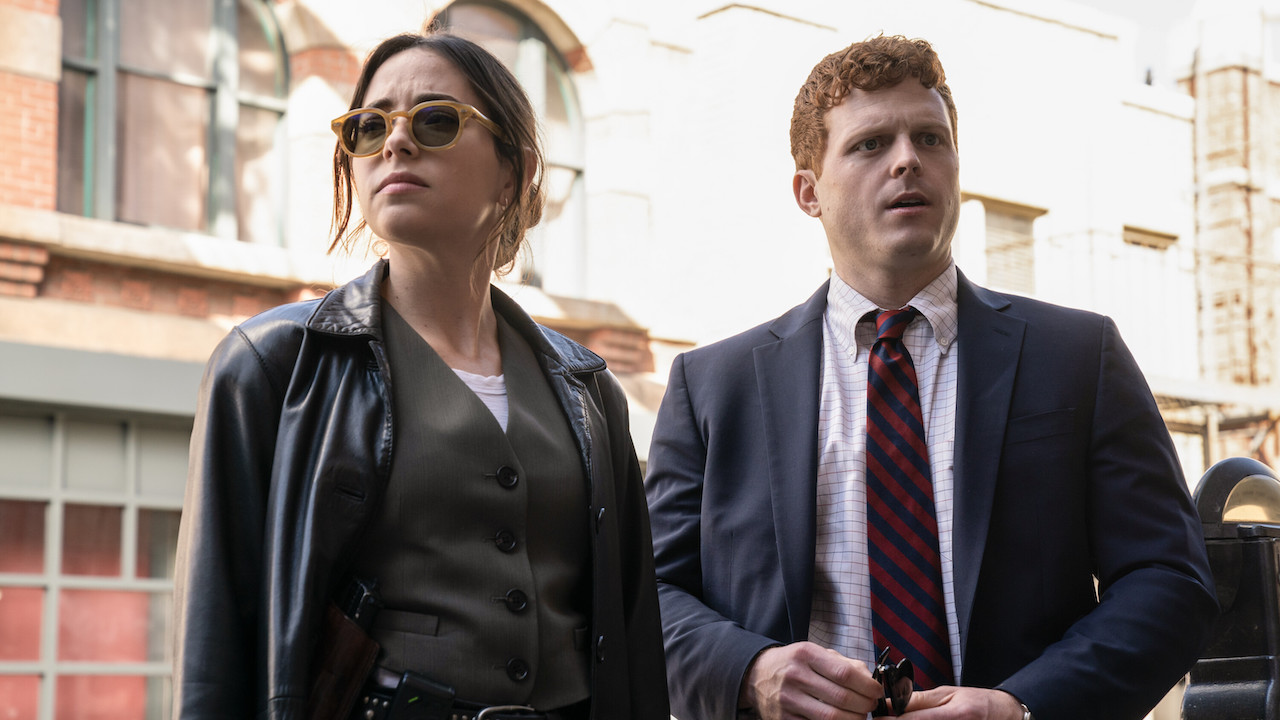It opens with a perfectly choreographed dolphin musical number, and ends with the disembodied head of deceased author Douglas Adams. This is the long awaited adaptation of his novel, “The Hitchhiker’s Guide to the Galaxy,” and as the dolphins flawlessly perform their rendition of “So Long and Thanks for All the Fish” you’ll realize you’re in for one hell of a ride. Don’t panic. It only gets a little weirder.
Douglas tragically passed away before filming began, but not before he’d nearly completed his own take on a “Hitchhiker’s Guide” script. With a few finishing touches from screenwriter Karey Kirkpatrick, that script has become this film; in other words Doug’s fingerprints are all over it. The movie lives and breathes Adams’s wit, and while that may be transparent to those who’ve never read his brilliant, hilarious (and often more poignant than Douglas would have cared to admit) novels, the picture benefits from it.
Not content to simply use Adams’ already great script, director Garth Jennings has gone further still in putting more Doug into it. The film is filled with homage to past Hitchhiker’s projects, including numerous references to the famed (and cheaply produced) BBC Miniseries. But Jennings stops at letting the movie become overwhelmed with fan nods and uses them to spice up what is a fantastic movie regardless of whether or not you’re a big enough “Hitchhiker’s” fan to get any of that.
Great adaptation or not, the movie hits on all cylinders as a unique piece of inspired lunacy. It’s easy enough to point out that there’s never been anything quite like it. Of course, there’s never been a director quite like Uwe Boll, so complete originality isn’t always a good thing. In this case though, it’s put to perfect use in the telling of Arthur Dent’s (Martin Freeman) story. Arthur, is a simple fellow who wakes up one morning and puts on his bathrobe. Before he’s even had breakfast, his house is destroyed and the Earth right along with it. Arthur escapes with his best friend Ford Prefect (Mos Def), who much to Arthur’s surprise turns out to be a hitchhiking alien and employee of a publication known as The Hitchhiker’s Guide.
Thus begins Arthur’s foray into the big wide universe. Freeman captures Arthur as sort of a bewildered, put upon soul perennially miffed that he can’t get a good cup of tea. When Ford breaks the news of his planet’s destruction to him, he hugs Arthur expecting an emotional breakdown. What he gets instead is resigned bewilderment, as Arthur somewhat unsteadily trudges on through the galaxy in his rather dowdy green bathrobe. Arthur is our primary source of realism. He keeps Hitchhiker’s Guide grounded in a somewhat relatable world no matter how many times a missile is turned inexplicably into a defeated bowl of petunias. That leaves us free to laugh gleefully at the film’s carefully designed absurdity, and oh yes I think there’s a little relevant social commentary still hanging around as well.
Zaphod Beeblebrox (Sam Rockwell) represents all that is most bizarre about Adams’ universe. If Arthur is our stiff upper lip everyman then Zaphod is the exact opposite – whatever that is. He picks up Arthur and fellow Earthling Trillian (Zoey Deschanel) and takes them on a wild ride, though he has absolutely no idea where he’s going. Rockwell fills Zaphod with an inexplicable sort of manic energy that leaves the character as a wired amalgam of George W. Bush, John Travolta, and a heavily stoned hippie.
Good though Rockwell is, it is the Hitchhiker’s Guide itself which runs away with the movie. Cleverly animated and voiced by Stephen Fry, The Book serves as a sort of background narration, a perfect device available to be consulted and in a pinch, lead the audience along to the next film’s segment. Fry’s work is absolutely gut-busting, and after a couple of Guide entries, the audience around me noticeably perked up whenever the film looked like it might lead into another. Most of these entries are taken directly from Adams’ novel, and those that aren’t feel exactly like they might have been.
Arthur’s galactic jaunt eventually takes him on a quest for the ultimate question. The ultimate question is of course, a vital key in understanding the ultimate answer which in the film we are told has been calculated as 42. In the depths of his quest, Arthur encounters paranoid androids, cult leaders, and a fjord designer named Slartibartfast, played with zest by the increasingly venerable Bill Nighy. It is somewhere in the midst of all this that Hitchhiker’s Guide encounters its only real speed bump, a somewhat forced love story between Arthur and Trillian. Neither Freeman nor Deschanel fails to deliver; their relationship simply seems out of step with the otherwise generally wry and sarcastic film around it. As is so often true in big Hollywood films, the love story simply doesn’t fit. Luckily, it occupies only a small corner of this particular universe, and as such does limited damage.
What’s certain is that The Hitchhiker’s Guide to the Galaxy succeeds as an experience unlike any other you’re likely to have at the theater. It’s packed wall to wall with the unexpected, and kills with delightful detail. Jennings background as a director of music videos doesn’t hint at the sort of skill he’s brought to bear on this adaptation. Of course it doesn’t hurt that his script was written by a true genius, in the form of Douglas Adams. This, like the novel, the radio play, and the questionable mini-series is another wonderful incarnation of Adams’ creation. I’d have been satisfied with something merely good, Jennings has delivered a film bordering on classic. Invariably, the film’s high concept and blisteringly paced dialogue will fly right over the heads of some moviegoers, but for those with the acumen to understand it, Hitchhiker’s Guide is the best movie so far in 2005.











